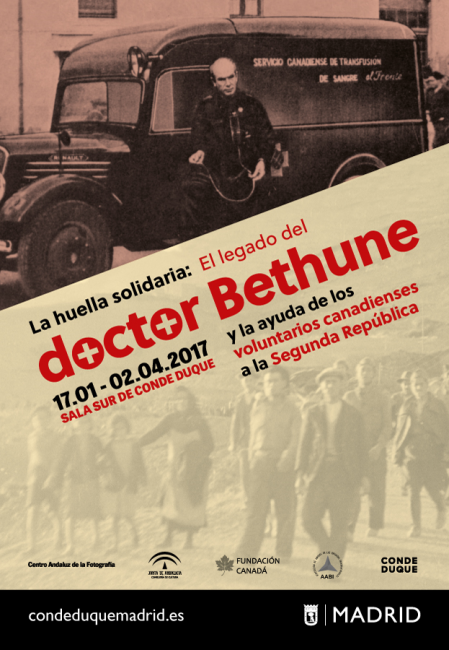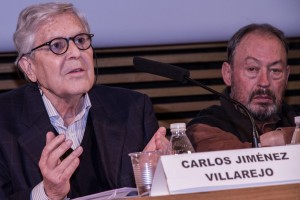Madrid Honors Dr. Norman Bethune with Exhibit
Norman Bethune, the reputed Canadian pulmonary surgeon who joined the Spanish Civil War as a volunteer for the International Red Aid, witnessed one of the war’s most tragic and least known episodes. A new exhibit in Madrid honors his life and work.
 “[I]magine 150,000 men, women and children setting out for safety to the town situated more than 100 miles away. There is only one road they can take. There is no other way of escape. This road, bordered on one side by the high Sierra Nevada mountains and on the other by the sea, is cut into the side of the cliffs and climbs up and down from sea-level to over 500 feet. The city they must reach is Almeria, and it is more than 200 kilometers away. … [W]omen, children and old people must face [a journey that] will take five days and five nights at least. … They must walk and as they walked, staggered and stumbled with cut, bruised feet along that flint, white road, the fascists bombed them from the air and fired at them from their ships at sea.”
“[I]magine 150,000 men, women and children setting out for safety to the town situated more than 100 miles away. There is only one road they can take. There is no other way of escape. This road, bordered on one side by the high Sierra Nevada mountains and on the other by the sea, is cut into the side of the cliffs and climbs up and down from sea-level to over 500 feet. The city they must reach is Almeria, and it is more than 200 kilometers away. … [W]omen, children and old people must face [a journey that] will take five days and five nights at least. … They must walk and as they walked, staggered and stumbled with cut, bruised feet along that flint, white road, the fascists bombed them from the air and fired at them from their ships at sea.”
The passage is from the notebook of Norman Bethune, the reputed Canadian pulmonary surgeon who joined the Spanish Civil War as a volunteer for the International Red Aid. His written testimony and the photographs of his assistant, Hazen Size, recall one of the most tragic and least known episodes of the Civil War. On February 8, 1937, as Málaga fell into the hands of the Francoist army, tens of thousands of people fled the city on foot. They were pursued by troops under the command of General Queipo de Llano, bombed from the air by German and Italian planes, and shelled from the sea by rebel ships.
“Bethune exemplified the battle for the recognition and effective guarantee of human rights”
Until April 2, an exhibit at the Conde Duque Cultural Center in Madrid honors the life and work of Dr. Bethune, including his participation in World War I, his work in Canada, his time in Spain and his death in China in 1939, where he traveled following the Japanese invasion to organize the medical services of the Chinese Army.
“Bethune exemplified the battle for the recognition and effective guarantee of human rights, and in particular international humanitarian law,” Carlos Jiménez Villarejo, a former Spanish anti-corruption public prosecutor said at a symposium accompanying the exhibit. “He bore witness to acts that amounted to an indiscriminate, brutal attack on the civilian population … that caused thousands of deaths. Eighty years have passed since that immense crime and no one has ever been held responsible for it in a court of law. But those grave crimes have not been proscribed, and it is entirely possible to hold those who committed and ordered them criminally responsible. Today’s event …. offers an outstanding opportunity to demand, once more, that Spain’s authorities create a Truth Commission—a demand shared by the United Nations—so that we may know precisely any and all crimes against humanity committed, first, by the rebels and, later, by the dictatorship, between July 18, 1936 and November 20, 1975.”
Alejandro Torrús writes for Público, which published a longer version of this text, in Spanish, on January 25, 2017. The talk by Jiménez Villarejo was published in CTXT: Contexto y Acción on January 30.













